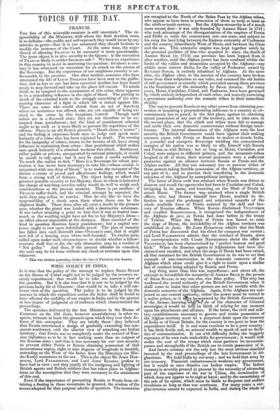TOPICS OF THE DAY.
FRANCIS.
THE fate of this miserable creature is still uncertain.* The re- sponsibility of the Ministers, with whom the final decision rests, is so delicate—the public and self-reproach they would incur by any mistake so great—that it is not unnatural they should hesitate to modify the sentence of the Court. At the same time, the expe- diency of allowing Filmic's to be executed is most questionable. The great object is to give security to the Queen : is the execution of FRANCIS likely to render her more safe ? We have no experience in this country to assist in answering the question : for above a cen- tury it has witnessed no execution for an attack on the person of the Sovereign. But the experience of our neighbour country is un- favourable to the practice. One after another, assassins who have attempted the life of Louis PHILIPPE have been sent to the guillo- tine, and as fast as one has been executed another has been found ready to step forward and take up the place left vacant. To minds liable to be tempted to the commission of this crime there appears to be a stimulating influence in the sight of blood. The putting to death of the criminal lends to the struggle something of the exte- nuating character of a fight in which life is staked against life. There are some who would shrink from an act of butchery where no resistance was offered, who are yet capable of being ex- cited to the crime by this imaginary contest. Though such minds are in a diseased state, they are not therefore to be ex- empted from punishment ; but the kind of punishment selected ought to be such as is most likely to prevent the repetition of the offence. There is au old Scotch proverb, "Death clears a' scores" ; and the feeling it expresses leads men to judge and speak more leniently of a crime that has been expiated by death. The craving for the sympathy of others, innate in the breasts of all, has a strong influence in restraining from crime : that punishment which makes men speak leniently of a criminal weakens this check. Sentiment, either public or private, unsupported by rational principle, it would be unsafe to rely upon ; but it may be made a useful auxiliary. To teach the nation to feel, " Here is a Sovereign for whose pro- tection it has never been necessary to take life—whose ermine is unspotted with one drop of blood," is to make the occupant of the throne a centre of proud and affectionate feelings, which would form a strong wall of defence. The object being to afford the greatest possible security to her Majesty, those to whom is intrusted the charge of watching over her safety would do well to weigh such considerations at the present moment. There is yet another : if FRANCIS suffer death, and the criminal attempt be repeated, the next Jury may refuse to convict. Men do not like to have the responsibility of a death upon them where there can be the slightest doubt. There does, after all, exist a doubt in the present case, whether the pistol was loaded with a destructive substance. It was rather straining a point to hint that it was so loaded inas- much as the wadding might have set fire to her Majesty's dress— an effect almost impossible at the distance. Mere mischief of the kind in question deserves heavy punishment ; but a capital sen- tence ought to rest upon indubitable proof. The plea of insanity has fallen into such discredit since OXFORD'S ease, that it might now fail of a hearing even where well founded. To twelve men, called upon under such circumstances to decide whether a fellow- creature shall live or die, the only alternative may be a verdict of "Not guilty." And thus, if the present offender be executed, the next may be let loose without any check or restraint upon him whatever.
* This was written yesterday, before the fate of leaartes was known.


























 Previous page
Previous page